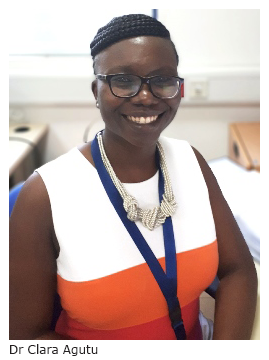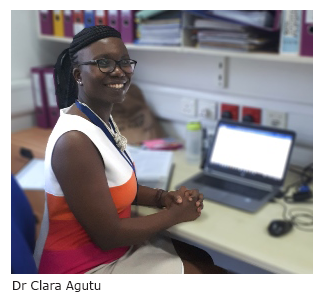Mentoring organization: GSK Vaccines
After her first experiences managing clinical trials in Kenya, Dr Clara Agutu came away with a strong conviction. Knowing how to do a clinical trial was not enough. She wanted to learn everything there is to know about bringing a new medicine or vaccine to market. As a TDR-sponsored Clinical Research and Development Fellow, she is acquiring precisely those skills.
 Born and raised in Nairobi, Kenya, Agutu says that she – as well as everyone she knew – has been in some way affected personally by HIV, tuberculosis or malaria. Entering her studies, these experiences compelled her to a career tackling
infectious diseases.
Born and raised in Nairobi, Kenya, Agutu says that she – as well as everyone she knew – has been in some way affected personally by HIV, tuberculosis or malaria. Entering her studies, these experiences compelled her to a career tackling
infectious diseases.
A medical degree at the University of Nairobi in 2009 was followed by an internship at Kenyatta National Referral Hospital, and then a Master’s in Public Health at the University of Nottingham in the United Kingdom.
In 2013 Agutu got her first job working on a clinical trial. She was hired as a clinical research training fellow at KEMRI-Wellcome Trust Research Programme in Kilifi, Kenya. She served as the coordinator and trial manager for a study called REALITY, which examined how to reduce early mortality in HIV-infected adults and children starting antiretroviral therapy.
Two years later, on the advice of senior staff at her institution who saw in her potential as a future leader in clinical research, she applied for and received a TDR Clinical Research and Development Fellowship, which is funded by the Bill &
Melinda Gates Foundation. Her assignment would allow her to continue her focus on infectious diseases but branch out to a different sphere: malaria vaccine development.
New horizons running multicentre clinical trials
Agutu landed in a team at GSK that was focused on the RTS,S malaria vaccine, a vaccine candidate at the time. Phase III trials were already completed at 11 sites in seven African countries. The research she was involved in focused on how to integrate the vaccine into childhood immunization programmes while maintaining its safety and immunogenicity.
The quest to have a sustainable response to health issues in Africa must be led by African scientists. TDR has helped us to develop a corps and a network of such African scientists.
- Dr Antony Etyang, KEMRI Wellcome Trust Research Programme, Kilifi, Kenya
The process involved trials in a number of sites. “GSK opened up a whole new world for me,” Agutu says. “In the Kilifi trial we were working in the field at one of several sites of a multi-site clinical trial. At GSK, I got the chance to work on different trials that are going on simultaneously in different countries.”
That means learning what it takes to develop protocols and how to deal with the operational aspects of running a multicentre trial, she says. “There is so much to take into account, such as how to deal with staffing, contracts and budgetary negotiations.”
Hands-on experience bringing vaccines to market
Beyond those skills, the GSK fellowship has satisfied Agutu’s personal mission to learn what it takes to actually bring a treatment or vaccine into clinical care. “As a fellow here, Clara got first-hand experience in all the different aspects of how vaccines are made and brought to market. This involved interactions with a great variety of stakeholders, including investigators and research organizations from different parts of Africa, international organizations and clinical development partners, among others,” says Dr Opokua Ofori-Anyinam, PhD, Director of Clinical Development and Agutu’s supervisor at GSK, Wavre.
Dr Opokua Ofori-Anyinam, who is from Ghana, notes that she is in a particularly good position to recognize what the TDR programme achieves for its fellows. “A programme like this one would have been a huge asset for me, but it was not available at my time. The fellowship is enormously valuable because it provides on-the-job training which is practical and not theoretical,” she says.
Developing African leadership for African research
According to Dr Antony Etyang, Agutu’s former supervisor at the KEMRI Wellcome Trust Research Programme in Kilifi, the TDR programme is playing a vital road in building a team of African experts who are able to ask and answer important research questions. “The quest to have a sustainable response to health issues in Africa must be led by African scientists. TDR has helped us to develop a corps and a network of such African scientists by exposing them to high-quality international research institutions,” he says.

Agutu completed her fellowship in January, 2017 and returned to the KEMRI Wellcome Trust Research Programme in Kilifi, with additional TDR support. There her PhD studies were embedded in a research project called “Impact of a Novel HIV-1 testing intervention to Detect Acute and Prevalent HIV Infection and Reduce HIV Transmission – Tambua Mapema Plus”. This was supported by a grant from SANTHE (Sub-Saharan African Network for TB/HIV Research Excellence).
A TDR re-integration grant was also provided to build capacity in her
country, which she used for training of health workers from
participating study sites and study staff in good clinical practice,
good clinical laboratory practice and the national
HIV testing algorithms.
It is also funded some advanced statistical and qualitative research methods courses for her PhD work.
Dr Ofori-Anyinam firmly believes Agutu has all the makings of a future leader. “She has an open mind and is quick to learn, but she is not afraid of expressing her opinions. And now, she has a broad network across Africa,” she says.
Agutu herself is more or less bursting with impatience to bring procedural mechanisms to which she has been exposed back to her home institution. “I have seen how we can apply standards, document things better and facilitate our work through measures like installing an electronic platform where everyone involved in a study can access information in real time,” she says.
For more information, contact Dr Pascal Launois.

